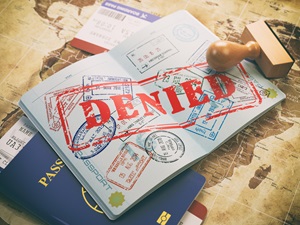What Can You Do If Your Case Was Denied?
”El Show Sin Fronteras”
Spanish Video Above Translated In English Below
What Can You Do If Your Case Was Denied?
Every year, thousands of immigrants begin their immigration process with hope. However, thousands of applications are rejected, too. According to the 2021 United States Citizenship and Immigration Services (USCIS) statistics, they denied 16% of permanent residency applications.
There is more to it than just a case denial. Yes, it has significant repercussions, including wasting time and, most importantly, money. However, a rejection does not have to be the end of the immigration journey. Here, you will learn the options when your case is denied and why it is vital to have an immigration attorney by your side.

What To Do When Your Case Is Denied?
When faced with the disappointment of a denied case relating to VAWA and permanent residence, it is crucial to approach the situation strategically.
For instance, suppose you are a foreign spouse of a U.S. citizen and were abused, and your case was denied when you applied for a VAWA petition. You will probably wonder what went wrong. You may think you must have a good chance of a favorable outcome because you qualify. One, you are a victim of domestic violence. Second, you are still married. Now, the important question here is, is there any other way?
As emphasized earlier, a case denial should not be the end of your immigration journey. So, if you face this situation, you can go back to the notice and review it, or you can make an appeal.
Review The Denial Notice
Reviewing the notice that states the denial of your case can give you a perspective on what went wrong with your application. You can check if there’s something incorrect or missing. It can also help clarify if there is some vital information you may have overlooked in one of the forms. Perhaps immigration officers asked for more evidence in the case, or you failed to respond to their request.
Reviewing the notice can remind you of the essential things you need so you can prepare the next time you try again. Moreover, doing so also allows you to look for the possibility of an appeal.
Make An Appeal
If your application is eligible for an appeal, you can do it and reapply. Appealing VAWA requires meticulous attention to detail and comprehensive documentation substantiating abuse claims.
This critical step involves gathering compelling evidence ranging from police reports and medical records to affidavits from witnesses. It is to create a compelling story of the survivor’s physical and emotional trauma.
In line with this, you may persuade USCIS to grant you permanent status under VAWA by carefully describing these conditions in an appeal letter.
Hire An Immigration Lawyer
Navigating the complex legal landscape surrounding immigration requires a deep understanding of the intricate processes involved. It would help to consider hiring a legal professional because doing it alone can be difficult.
Like the imagined situation mentioned earlier, it is helpful if you do not face this alone. The support and guidance of an immigration lawyer are significantly necessary. They can explain how your immigration status and criminal history affect your case.
You may qualify for VAWA, but there needs to be assurance if it’s a straight path to residency or if you will only stay at VAWA. The small details and responsibilities may be difficult to understand when you are not with an immigration lawyer.
Dealing with the consequences of domestic violence is already challenging. If you’ve already invested time and money and your case was denied, not appealing means losing your money and time invested. You may think, “Who will give back your money? And how much is your time worth?” Considering these things is essential before deciding to handle the case alone.
By thoroughly reviewing your case, immigration lawyers can identify potential errors or inconsistencies that may have led to the denial. Their guidance can help gather additional evidence, present compelling arguments, and advocate on your behalf during appeals.
How Long Does An Appeal Take?
The time required to resolve an appeal can vary considerably depending on several factors. These factors include the case’s complexity, the court’s schedule, the number of parties involved, and the availability of judges or justices assigned to the case.
Usually, VAWA can get the work permit quickly, within nine months. But the entire decision takes almost two years. That’s why sometimes they recommend a new case because it will be faster. You can go another way by checking if it has an open work permit and if you can continue renewing it. This factor is essential because Immigration often focuses on eligibility to work legally in the United States.
In line with this, having the assistance of an immigration attorney is beneficial because they know how to devise a strategy. They look for a solution to get a work permit quickly. If there is one, then immigration lawyers will fight for that.
What Happens When A Case Is Denied?
Denial of your case can occur for various reasons, including missing or incomplete documentation, failure to meet eligibility criteria, or potential fraud concerns.
Sometimes, when a case is denied, there is a tendency for Immigration to review it or file it in court. This step may be risky as they may see the possibility of deportation. However, not all cases can end in removal.
The risk of deportation from a denied case usually happens when you commit criminal activities or violations. The U.S. immigration system takes these violations seriously and may initiate deportation proceedings if they confirm that you did it. Crimes such as drug trafficking, fraud, or violent offenses can bring about deportation, especially if considered aggravated felonies under immigration law.
Additionally, individuals who have violated their immigration status by engaging in fraudulent activities, such as marriage fraud or falsifying documents, may face deportation. Immigration authorities have strict regulations to combat fraudulent immigration practices and take these violations seriously. You have to make sure before starting an immigration case that the client qualifies and that authorities will not deny the petition.
What Can You Do While Waiting For Cancellation?
While awaiting a decision on the cancellation of the removal case in the United States, you may have to deal with a limited range of legal activities. Also, you must adhere to specific guidelines to enhance your chances of a favorable outcome. To this end, attending all scheduled immigration court hearings and appointments is equally vital. Failing to do so may lead to the issuance of a removal order in one’s absence.
Additionally, there are several necessary steps that you can take to manage your situation effectively. Being proactive and navigating through the process with care and diligence is essential. Here are some key actions you can consider during this waiting period:
- Gather supporting documents: Collect and organize relevant documents showcasing your ties to the United States and demonstrating your contributions to society. It can include employment records, educational achievements, community involvement, and testimonies from friends, family, or colleagues.
- Maintain compliance with immigration regulations: You must continue to adhere to all immigration rules and regulations while awaiting the cancellation of deportation. It includes maintaining lawful status, fulfilling reporting requirements, and avoiding criminal activities that could negatively impact your case.
- Stay informed and up-to-date: Continually educate yourself about changes or updates in immigration law or policies that could affect your case. Stay connected with reliable immigration resources, attend seminars or workshops, and subscribe to newsletters or legal updates from reputable sources.
You can make the most out of your waiting time while keeping a positive attitude. Moreover, seeking counsel from an experienced immigration attorney is highly recommended. They can assess the case, provide essential legal advice, and serve as representation in court.
Why Hire Lincoln-Goldfinch Law – Abogados de Inmigración?

Lincoln-Goldfinch Law – Abogados de Inmigración stands out as a trusted source of guidance in immigration law. With a team of skilled attorneys, the firm boasts an intimate understanding of the intricate nuances often entangled within the web of immigration processes.
What sets Lincoln-Goldfinch Law – Abogados de Inmigración apart is its unwavering commitment to its clients. Individuals seeking their services can rest assured that they will receive personalized attention uniquely tailored to their specific circumstances. Whether the goal is to secure permanent residency under the Violence Against Women Act (VAWA) provisions or to address any other immigration-related concerns, Lincoln-Goldfinch Law – Abogados de Inmigración is dedicated to crafting a robust case strategy.
This dedication to client advocacy shines through in their meticulous approach to gathering documentation and their thorough preparation. They leave no stone unturned in ensuring their clients are well-prepared to navigate the often complex and challenging path toward immigration solutions.
For those facing immigration issues, harboring doubts, or dealing with undocumented status, Lincoln-Goldfinch Law – Abogados de Inmigración is willing to provide the guidance and support needed. With their knowledge and commitment to client welfare, they offer a lifeline for individuals seeking resolution in the realm of immigration law.
Summary
Facing a denied immigration case, especially involving VAWA or permanent residency, can be daunting. However, it’s not the end of the road. Reviewing the denial notice, appealing, and seeking legal counsel are crucial steps. An immigration lawyer can help clarify options, streamline the process, and potentially expedite decisions.
While appeals vary in duration, professional assistance can help secure work permits and navigate complex immigration law. It’s essential to address denials promptly, considering the potential risks, including deportation in cases of criminal activity or violations.
If you have additional questions about your immigration case denied, or your specific case, you may contact us at (855) 502-0555. After a brief 10-minute evaluation of your case over the phone, we will let you know what options you have. You can also follow us on our social networks so you don’t miss our weekly broadcasts on Facebook, YouTube and Twitch.
Contact A U.S. Immigration Attorney Today!
Categories
How To Find Us
What Our Clients Say
“This Lawfirm is great, very professional and helpful. I love that they are always in communication and always available for when you have questions . 100% recommended by me and my family. Thank you Lincoln-Goldfinch Law – Abogados de Inmigración”





